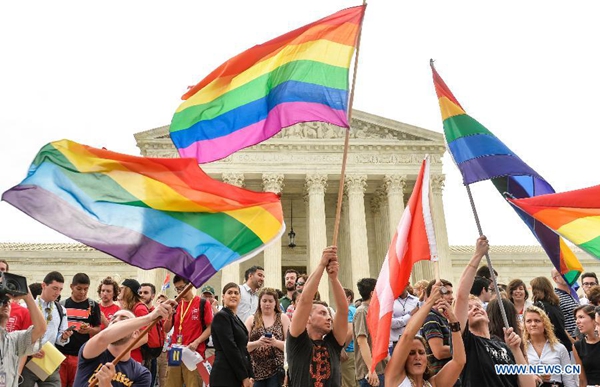China's inevitable path to same-sex marriage
- By Ember Swift
 0 Comment(s)
0 Comment(s) Print
Print E-mail China.org.cn, July 25, 2015
E-mail China.org.cn, July 25, 2015
|
People in support of same-sex marriage rally outside the Supreme Court in Washington D.C., the United States, June 26, 2015. The U.S. Supreme Court on Friday ruled that there is a right to same-sex marriage in all 50 states across the country. (Xinhua) |
The United States Supreme Court's ruling on same-sex marriage was a landmark decision for the United States, "the land of the free and the home of the brave." This decision has generated a global response. Even though their Canadian neighbors passed a law legalizing same-sex marriage in 2003, it would seem that U.S. lawmakers needed thirteen years to finally come to their senses.
The topic of same-sex marriage is not new to Chinese citizens, but it is one that is usually discussed on the periphery, and such discussions usually occur behind closed doors in the company of friends and family, rarely in public. For this reason, the Chinese LGBTQ community must be innovative in its endeavors to enlighten an enormous public about their identities and lack of specific rights and freedoms equivalent to those possessed by heterosexual Chinese citizens. Part of this process is already under way.
Homosexuality in China is still a topic discussed in hushed voices. But Chinese culture is traditionally implicit about sexuality, regardless of one's leanings, and the media reflects this. Television dramas only hint at physical relations between leading men and ladies, for instance, and there are rarely any advertisements in public spaces that overtly sexualize the human body. Sexuality certainly exists behind the closed doors of this culture, but discussing it openly is considered in poor taste - too crass, too Western.
Thus, when rights and privileges such as the important right of marital union are up for discussion, these doors must be opened slightly. And, while these doors are ajar, private lives are glimpsed, even if only through innuendo. The resulting discomfort is so great that the discussion often falls flat, or worse, becomes scandalizing. I would venture to suggest that Chinese culture does not see same-sex marriage as a political issue; it's personal, period. The old mantra that "the personal is political" is, once again, a very Western notion.






